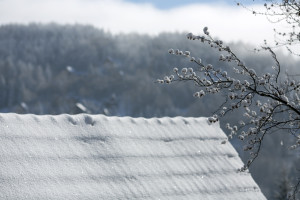It’s no secret that Colorado sees more than its fair share of winter weather. Yes, we’re famous for our 300 days of annual sunshine, but we also have plenty of ice and snow to go around as well.
 According to Colorado State University, Colorado’s Front Range receives an average of 40-60 inches of snowfall per year (53.8 inches in Denver), with mountain locations averaging far, far more. Crested Butte, for instance, tops out with some 216 inches of snow every year, while Aspen isn’t far behind with 178.
According to Colorado State University, Colorado’s Front Range receives an average of 40-60 inches of snowfall per year (53.8 inches in Denver), with mountain locations averaging far, far more. Crested Butte, for instance, tops out with some 216 inches of snow every year, while Aspen isn’t far behind with 178.
And all of those winter storms do damage, as well, both here in Colorado and nationwide.
According to the Insurance Information Institute, winter weather contributes to some 7.5% of all insured losses in the U.S., totaling more than $30 billion in 2015. In fact, through the first half of 2016, winter storms and “cold waves” had already killed 55 across the country and done more than $3.3 billion in damage.
Cleary, the risks associated with winter weather are very real.
Fortunately for those of us in Colorado, our climate means we don’t often see the true, extended deep-freezes that can be so damaging in other parts of the country. Typically, when we see snow on the Front Range, it falls one day and has melted by the next. Not only does this make for more pleasant living, but it helps prevent ice and snow from building up on structures and in gutters, limiting the damage they can do over time.
But there’s a flipside to this “advantage”: our freeze-thaw cycles can be sharp. That can be potentially damaging to brickwork, landscaping and any number of a home’s external systems. And, although they often come and go quickly, winters storms on the Front Range can be strong, dumping feet of snow in a short period of time, worsening the temperature swings that our homes face during the months of November through April.
For homeowners, this isn’t just a problem outside, either.
A home’s interior can be badly damaged by cold weather as well, with freezing pipes, water intrusion and heating system damage all at risk this time of year.
How should Colorado homeowners prepare their homes for the winter season?
Gutters: Clean out your gutters before the first snow falls, removing any leaves, sticks and other debris that may have gathered over the course of the fall season. This will ensure that snow and ice can move freely through the gutters, as they’re designed to, and help prevent the buildup of ice dams that can eventually force water up into the home. It’s also a good idea to install gutter guards where possible, to prevent debris buildup in the first place.
Trees and Greenery: Trim any trees in your yard and be sure to remove any dead or overhanging branches. Anything that’s loose or at risk in the fall will surly come crashing down under the weight of winter’s ice and snow, potentially damaging your home in the process.
Structure: This should be a no-brainer, but you always want to seal any cracks and holes in your outside walls and foundations to prevent cold air and water from entering the structure. This also helps avoid freeze damage within your walls and foundation from water than seeps in and then freezes. Caulk and weather striping and good solutions to solve this problem.
Indoors: As mentioned, winter isn’t only a risk to your home’s exterior. Many different systems indoors also rely on warm, consistent temperatures to remain functional. That said, step one for every homeowner in Colorado should be to have their heating system inspected and serviced ahead of the cold season. That way you’ll be secure in your furnace’s ability to keep your home at 65 degrees or above all winter long. Further, add extra insulation to attics, basements, crawl spaces and wherever else it is needed, and check your pipes regularly over the course of the winter to spot and repair any leaks and cracks before they become much bigger problems.
As with everything in the home, early prevention is the key to a safe, comfortable home, year after year. Remember, though, the time to begin winterizing is before the snow starts to fall and get started making preparations right away.

